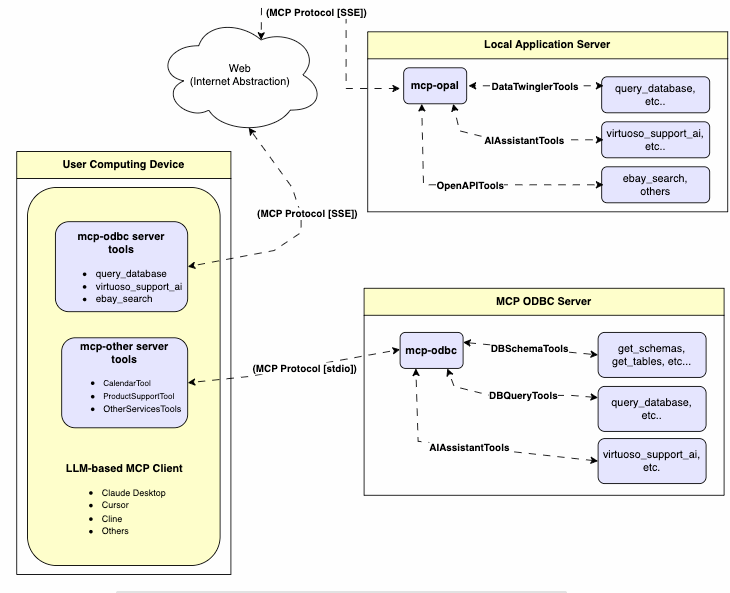About
A lightweight TypeScript MCP server that routes Model Context Protocol calls to local ODBC drivers, enabling large language models to query any ODBC‑enabled database via standard SQL or SPARQL queries.
Capabilities

The OpenLink MCP Server for ODBC bridges the gap between large language models and any database that exposes an ODBC driver. By exposing a lightweight TypeScript layer over , the server translates MCP tool calls into native ODBC operations, allowing AI assistants to query, describe, and manipulate relational data without writing custom connectors for each DBMS. This abstraction is invaluable when an organization already relies on a heterogeneous database ecosystem; the MCP server can be pointed at any DSN, turning disparate data sources into a single, discoverable API for LLMs.
At its core, the server offers a suite of declarative tools that cover common database interactions. Developers can ask the assistant to list available schemas (), enumerate tables within a schema (, ), or retrieve detailed metadata about a table’s columns and constraints (). For data retrieval, the server provides both raw SQL execution (, ) and higher‑level semantic queries such as SPARQL or SPASQL, returning results in JSON Lines or Markdown tables. A specialized tool () demonstrates how the server can delegate AI‑centric logic back to a Virtuoso Support Assistant, showcasing bidirectional integration between LLMs and database‑specific assistants.
The MCP server’s value lies in its transparent, schema‑aware access. Because the tools expose metadata first, an LLM can dynamically discover the structure of a target database before crafting queries, reducing guesswork and errors. The JSONL output streamlines downstream processing: developers can pipe results directly into data pipelines, visualizations, or further LLM prompts. The Markdown output option is ideal for conversational interfaces where the assistant can present tabular data in a human‑readable format without additional rendering logic.
Real‑world scenarios include data exploration for business analysts, automated report generation, or building chatbots that answer product‑specific questions by querying a catalog database. In research environments, the SPARQL and SPASQL tools enable LLMs to interrogate RDF stores or semantic datasets, making it straightforward to ask complex graph queries in natural language. The server’s compatibility with any ODBC driver also means it can serve legacy systems, cloud data warehouses, or on‑premise databases—all through the same MCP contract.
Unique advantages stem from its minimal footprint and explicit environment configuration. By leveraging and the MCP SDK, developers avoid reinventing connection logic while still benefiting from type safety via Zod schemas. The use of environment variables for DSN, credentials, and optional LLM API keys ensures secure deployment in CI/CD pipelines or containerized environments. Overall, the OpenLink MCP Server for ODBC empowers AI assistants to become first‑class data consumers in modern, data‑rich applications.
Related Servers
n8n
Self‑hosted, code‑first workflow automation platform
FastMCP
TypeScript framework for rapid MCP server development
Activepieces
Open-source AI automation platform for building and deploying extensible workflows
MaxKB
Enterprise‑grade AI agent platform with RAG and workflow orchestration.
Filestash
Web‑based file manager for any storage backend
MCP for Beginners
Learn Model Context Protocol with hands‑on examples
Weekly Views
Server Health
Information
Explore More Servers
Azure Wiki Search Server
AI-powered search for Azure Edge wiki content
AWS Cost Explorer MCP Server
Natural‑language AWS cost insights via Claude
ESP MCP Server
Unified ESP-IDF command hub via LLM
MCP ODBC via SQLAlchemy Server
FastAPI-powered ODBC server for SQLAlchemy databases
Akshare MCP Server
Expose thousands of AKShare data APIs via MCP
Firebase MCP
AI-driven access to Firebase services